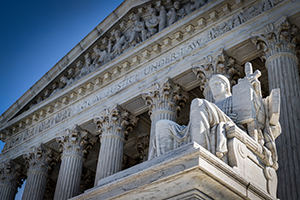
The U.S. Supreme Court is poised to issue a decision later this spring in two cases challenging the race-conscious admissions programs at Harvard University and the University of North Carolina (UNC) at Chapel Hill. The highly anticipated ruling could have broad ramifications for how colleges and universities consider an applicant’s race and ethnicity as part of the holistic review process in admissions.
AACRAO recently hosted a webinar—led by Art Coleman, managing partner and co-founder of EducationCounsel LLC—providing an overview of the claims in the cases and the implications of a variety of potential outcomes the court may consider. Coleman offered practical strategies and steps that enrollment leaders should consider in light of the court’s pending decision. To further help institutions prepare for the Supreme Court ruling, the association also issued guidance encouraging members to begin to examine any admissions or recruitment practices that target populations of a specific race as well as their overall holistic/equity admissions processes.
SFFA v. UNC and SFFA v. Harvard
Last fall, the U.S. Supreme Court heard oral arguments in the Harvard and UNC admissions cases. The plaintiff in both cases, Students for Fair Admissions (SFFA), alleges that both institutions intentionally discriminated against Asian American applicants in their admissions processes. SFFA asked the high court to overturn its ruling in Grutter v. Bollinger, a 2003 landmark decision that held colleges can consider race and use holistic reviews as long as their affirmative action programs are narrowly tailored.
Ahead of oral arguments, AACRAO joined the National Association for College Admission Counseling (NACAC), ACT, Inc., and the College Board in an amicus brief to inform the Supreme Court of the importance of continuing to allow admission professionals to holistically review all factors regarding applicants.
Lower courts found that both Harvard and UND complied with Supreme Court precedents that said race may be used as one factor universities can consider in a wide-ranging evaluation of applicants. However, SFFA argues that justices should overturn those precedents and rule that considerations of race, which aid underrepresented students, violate federal law and the Constitution.
The decision to hear the cases comes at a time when the composition of the Supreme Court differs significantly from the majorities that decided Grutter in 2003 and reaffirmed it in 2016. Therefore, it remains uncertain whether justices will uphold or overrule decades of legal precedent that allows race-conscious admissions in higher education in the interest of achieving student body diversity.
The Supreme Court will issue a final decision on the cases by the end of June.
AACRAO Guidelines in Preparation for the Supreme Court Decision
In anticipation of that decision, AACRAO recently issued guidance to prepare members for a possible major change in their ability to consider an applicant's race and ethnicity as part of a holistic/equity review in admissions. The guidelines encourage members to begin to examine any policies, practices, or procedures where race and/or ethnicity is or may be a factor.
The self-audit document provides a framework to support a broad review of programming that may be impacted by the Supreme Court’s forthcoming ruling. The guidance recommends that institutions proactively assess risks and formulate a mission- and values-based communication plan ahead of the decision.
Current holistic admissions practices adhere to a legal framework that has grounded diversity efforts for decades. AACRAO believes these practices are instrumental in helping institutions to identify students who are likely to thrive in their educational programs.
For the latest information on this issue, visit https://www.aacrao.org/advocacy/issues/affirmative-action-challenge/